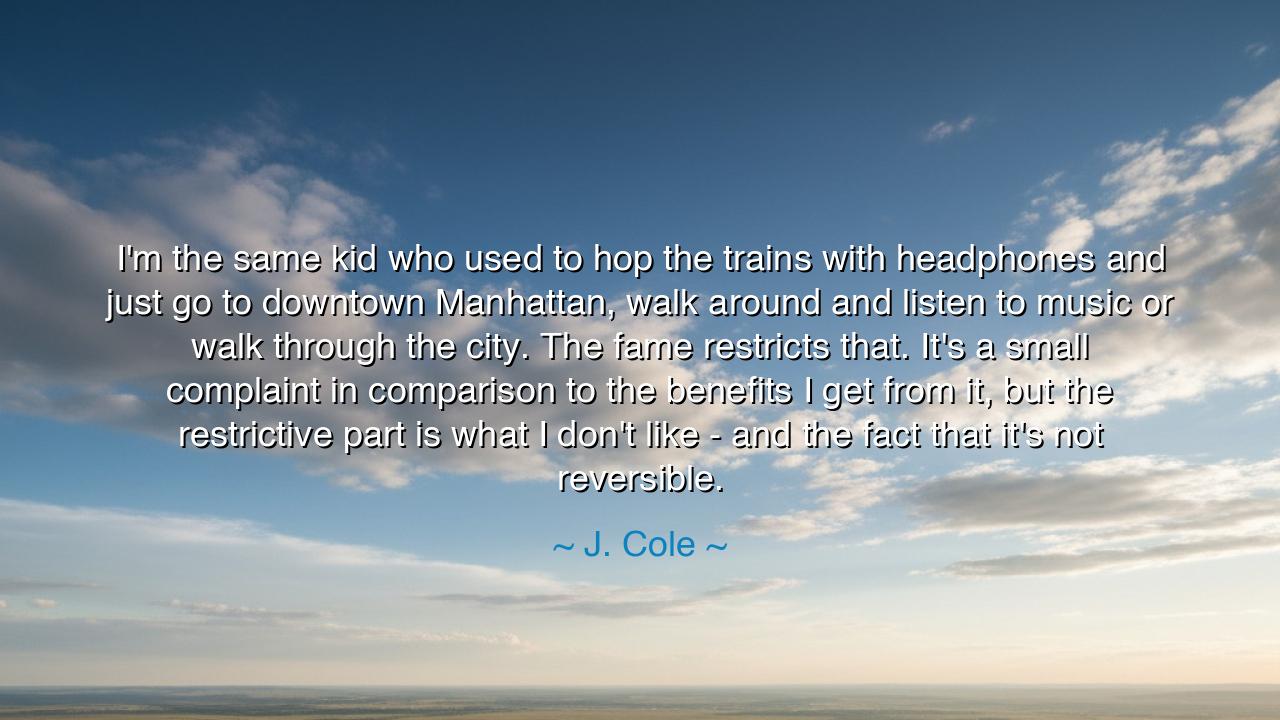
I'm the same kid who used to hop the trains with headphones and
I'm the same kid who used to hop the trains with headphones and just go to downtown Manhattan, walk around and listen to music or walk through the city. The fame restricts that. It's a small complaint in comparison to the benefits I get from it, but the restrictive part is what I don't like - and the fact that it's not reversible.






"I’m the same kid who used to hop the trains with headphones and just go to downtown Manhattan, walk around and listen to music or walk through the city. The fame restricts that. It’s a small complaint in comparison to the benefits I get from it, but the restrictive part is what I don’t like—and the fact that it’s not reversible." Thus spoke J. Cole, a voice of his generation, and though his words carry the cadence of the modern world, they echo with the eternal truth that has haunted all who rise from obscurity into renown: the price of glory is freedom lost.
Once, he was but a kid, wandering through the veins of New York, a dreamer with music in his ears and wonder in his eyes. The trains carried him not merely across the city, but through the endless corridors of imagination, where every corner, every face, every sound became inspiration. In anonymity there was liberty—the power to vanish into the crowd, to breathe without being watched, to learn from the raw pulse of life around him. This is the treasure of obscurity: to live unseen, yet fully alive.
But fame, like a golden crown, is both blessing and burden. It lifts the one who wears it above the multitude, granting benefits beyond imagining: influence, wealth, and a platform from which to shape the world. Yet it also forges invisible chains. Where once he could walk freely, now every step is shadowed by the gaze of others. The simple joy of blending into the crowd is gone, and with it, a part of the soul’s innocence. And, as J. Cole laments, this loss is not reversible; once the world has carved your name into its memory, you can never return to being unknown.
The ancients knew this paradox well. Think of Marcus Aurelius, emperor of Rome, who wrote in his Meditations of the burden of ruling. He longed for solitude, for simplicity, yet he bore the weight of empire. His fame gave him the throne of the known world, yet it stole from him the liberty of walking unseen among his people. So too with kings, prophets, and poets: their greatness gave them voice, but silenced the quiet freedoms they once cherished.
And yet, let us not mistake Cole’s reflection for ingratitude. He himself admits the benefits outweigh the complaint. To shape lives with music, to inspire millions, is a sacred calling. But his words remind us of the balance we must strike. We often crave renown, but seldom pause to ask what must be given up to attain it. The old life cannot be retrieved once left behind; the past remains a memory, not a refuge.
The lesson for us is clear: treasure the simple freedoms you possess now, for they are more precious than you may realize. To walk unseen through the city, to listen to music without interruption, to breathe in the world without a thousand eyes upon you—these are riches hidden from kings. If fortune one day crowns you, accept it with gratitude, but remember the weight it will place upon your shoulders.
Practical wisdom calls us to gratitude. Each day, savor the small moments: the quiet walk, the train ride, the chance to vanish into the rhythm of life. Do not despise obscurity, for it is fertile ground where dreams grow. And if you rise to fame, guard a corner of your life where the soul may still be free, where you can remember the kid you once were, headphones on, wandering the streets in peace.
Thus, J. Cole teaches us not only of the burden of fame, but of the beauty of the ordinary. His words are a beacon: do not wait until freedom is gone to treasure it. Live fully now, in the small, the quiet, the unseen. For it is these moments, more than crowns or riches, that make a soul truly alive.






AAdministratorAdministrator
Welcome, honored guests. Please leave a comment, we will respond soon